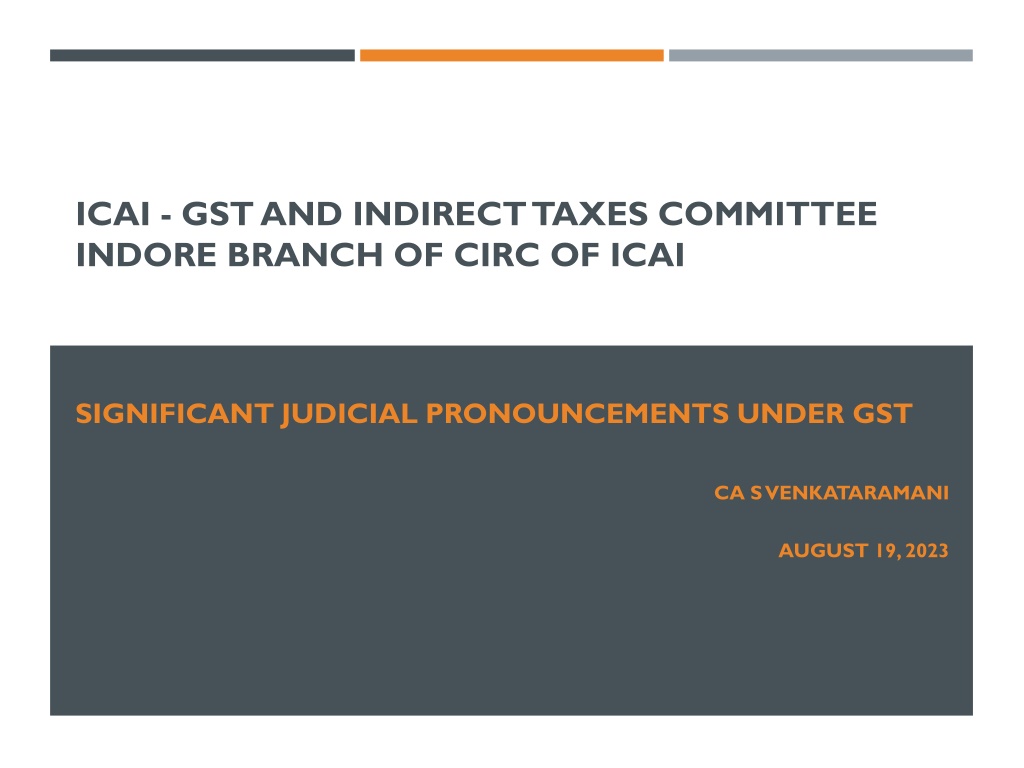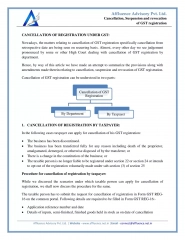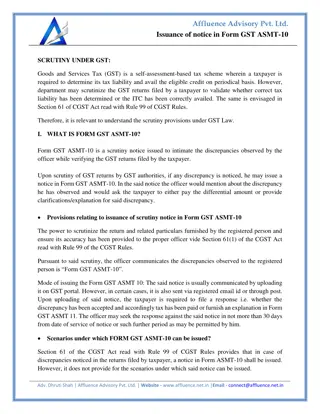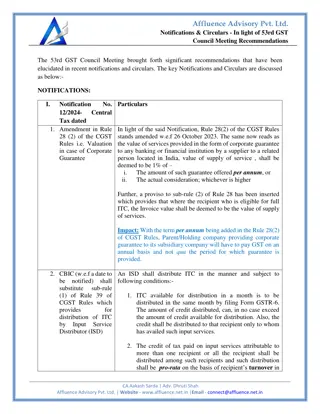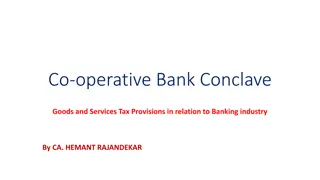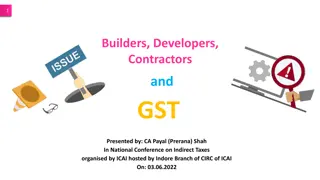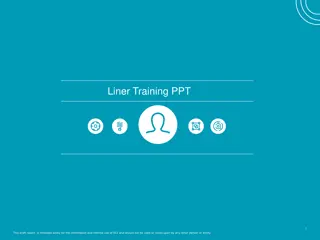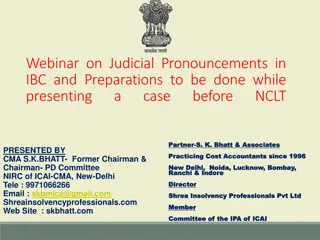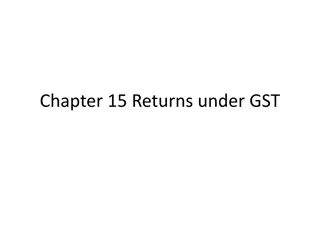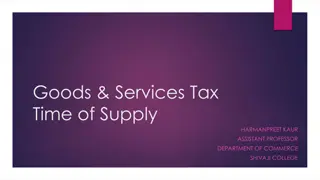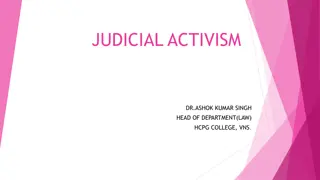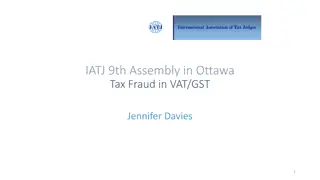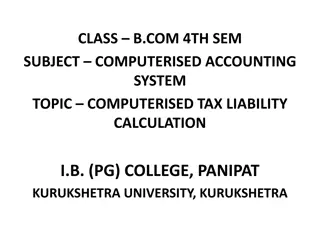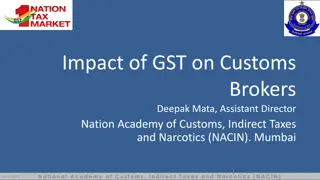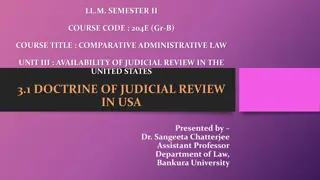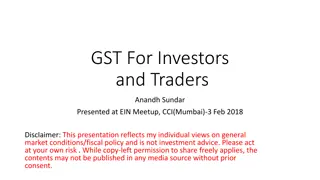Important GST Judicial Pronouncements and Case Law Updates
The content discusses significant judicial pronouncements and case law updates related to GST, focusing on issues such as reversal of input tax credit, detention of goods during transit, and responsibilities of purchasers under the CGST Act. It emphasizes the importance of compliance, clarification on GSTR-2A, and the impact of supplier default on input tax credit availing.
Download Presentation

Please find below an Image/Link to download the presentation.
The content on the website is provided AS IS for your information and personal use only. It may not be sold, licensed, or shared on other websites without obtaining consent from the author. Download presentation by click this link. If you encounter any issues during the download, it is possible that the publisher has removed the file from their server.
E N D
Presentation Transcript
ICAI - GST AND INDIRECT TAXES COMMITTEE INDORE BRANCH OF CIRC OF ICAI SIGNIFICANT JUDICIAL PRONOUNCEMENTS UNDER GST CA S VENKATARAMANI AUGUST 19, 2023
SUNCRAFT ENERGY (P.) LTD. VS ASSISTANT COMMISSIONER, STATE TAX [2023] 153 TAXMANN.COM 81 (CALCUTTA) Revenue reversed appellant's input tax credit under WBGST Act, alleging non- reflection of supplier invoices in GSTR 2A for FY 2017-18; Appellant argued compliance with Section 16(2), payment to supplier via valid tax invoice; Held: Press release dated 18-10-2018clarifies GSTR-2A for taxpayer facilitation and does not impact input tax credit availing; Reversal of credit from buyer optional except under exceptional circumstances of collusion, missing supplier, or lack of assets; Appellant clarifies invoice possession and payment via bank statements- Revenue failed to inquire on supplier despite clarifications; Arise India Limited vs Commissioner of Trade and Taxes, Delhi case establishes denial of credit due to supplier's default unconstitutional; Show cause notice faults appellant's GSTR 1, not tax invoice possession or receipt; Hence, action against supplier essential before seeking reversal from appellant; Revenue's action deemed to be arbitrary-Impugned order set aside, authorities to follow CBIC guidelines
ARHAAN FERROUS AND NON-FERROUS SOLUTIONS (P.) LTD. VS DEPUTY ASSISTANT COMMISSIONER-1(ST) [2023] 153 TAXMANN.COM 325 (ANDHRA PRADESH) Revenue authority detained goods of petitioner-purchaser while they were in transit from Vijaywada to Telangana; Revenue authority initiated proceedings against R-4 consignor under section 130 of CGST Act in view of his absence in given address and not holding any business premises at Vijayawada; HELD: Revenue authority could not confiscate goods of petitioner purchaser merely for reason that petitioner purchased goods from R-4; Responsibility of petitioner purchaser would be limited to extent of establishing that he bonafidely purchased goods from R-4 for valuable consideration by verifying GST registration of R-4 available on official web portal and he needed not aware of credentials of said R-4; Purchaser had to establish mode of payment of consideration and mode of receiving of goods through authenticated documents; Except that petitioner purchaser could not be expected to speak about business activities of R-4 and also whether he obtained GST registration by producing fake documents;
ARHAAN FERROUS AND NON-FERROUS SOLUTIONS (P.) LTD. VS DEPUTY ASSISTANT COMMISSIONER-1(ST) [2023] 153 TAXMANN.COM 325 (ANDHRA PRADESH) In that view, respondent authority was not correct in roping petitioners in proceedings initiated against R-4 consignor without initiating independent proceedings under section 129 of CGST/APGST Act against petitioners; Writ petitions were, accordingly, to be disposed of giving liberty to respondent authority to initiate proceedings against petitioners under section 129;
THIRUMALAKONDA PLYWOODS VS ASSISTANT COMMISSIONER - STATE TAX, CIRCLE-1 [2023] 152 TAXMANN.COM 640 (ANDHRA PRADESH) Time limit prescribed for claiming ITC under section 16(4) of APGST Act/CGST Act, 2017 is not violative of Articles 14, 19(1)(g) and 300-A of Constitution of India; Section 16(2) of APGST/CGST Act, 2017 has no overriding effect on section 16(4) as both are not contradictory with each other; they operate independently; Mere acceptance of Form GSTR-3B returns with late fee will not exonerate delay in claiming ITC beyond period specified under section 16(4) of APGST/CGST Act, 2017;
MUNJAAL MANISHBHAI BHATT VS UNION OF INDIA [2022] 138 TAXMANN.COM 117 (GUJARAT) Issue: Whether land deduction at one-third as prescribed in the rate Notification is constitutionally valid? Held: In computing taxable value in construction contract, prescribing mandatory uniform rate of deduction of one third of total amount towards land value in terms of paragraph 2 of Notification No. 11/2017-Central Tax (Rate) instead of available actual price of land which can be determined, is ultra vires CGST Act and is discriminatory, arbitrary and violative of article 14 of Constitution of India as well; Fixed deduction towards sale of land cannot be provided by way of notification where actual price is available; prescription under section 15(5) of CGST Act has to be by way of rules and not by notification; GST is not payable on sale of developed land if such development activity has been undertaken before getting into an agreement with prospective buyer
UNION OF INDIA VS MOHIT MINERALS (P.) LTD. [2022] 138 TAXMANN.COM 331 (SC) Issue: Whether ocean freight in a CIF contract is liable to GST under reverse charge mechanism? Held: In CIF contract of import, an Indian importer cannot, on a reverse charge basis, be subjected to levy of IGST separately on component of ocean freight paid by foreign seller to foreign shipping line; Specification of Indian importer as recipient of service by Notification No. 10/2017-Integrated Tax (Rate) is only clarificatory; this notification does not specify taxable person different from recipient prescribed in section 5(3) IGST Act for reverse charge; Mere payment of consideration by foreign exporter to foreign shipping line in CIF imports does not mean that there was no supply of freight service to importer;
UNION OF INDIA VS MOHIT MINERALS (P.) LTD. [2022] 138 TAXMANN.COM 331 (SC) Importer of goods in India is to be considered as recipient of service of transportation of goods by vessel from outside India to a place in India as he is ultimate beneficiary though shipping service is provided by foreign shipping line to foreign exporter in CIF contract; Levy of GST on supply of transportation service by foreign shipping line to foreign exporter to import goods into India is not extra-territorial as services are rendered for benefit of Indian importer and transaction has nexus with territory of India; Recommendations of GST Council are not binding on legislation; they only have pursuasive value; Article 246A of Constitution provides Parliament and State Legislatures with equal and concurrent power to legislate on GST;
RADIANT ENTERPRISES (P.) LTD. VS JC, CGST & CX (APPEAL-I) [2023] 147 TAXMANN.COM 245 (CALCUTTA) Appellate authority passed order on issues which was neither case before original authority nor emanated from order passed by adjudicating authority but was suo motu raised by appellate authority on which decision was rendered against appellants; HELD: CGST Act does not provide for filing cross appeal by department in statutory appeal filed before appellate authority under section 107 of CGST Act - In case power to file cross appeal had to be invoked, notice was to be served on taxpayer; However, no direction was issued to any authority to file an application for considering other issues; Even assuming that Appellate Authority had such jurisdiction, in absence of any notice it would be in violation of principles of natural justice; Appellate authority could not have taken a decision on issue which did not emanate from order passed by original authority;
RADIANT ENTERPRISES (P.) LTD. VS JC, CGST & CX (APPEAL-I) [2023] 147 TAXMANN.COM 245 (CALCUTTA) Detention of goods and vehicle - Release of - Vehicle of petitioner and goods transported in said vehicle were detained by department; Owner of goods neither responded to show cause notice nor order demanding tax and penalty was served upon him; HELD: Phrase "person transporting goods" used in section 129 means owner or his agent who contracted to supply goods and not transporter who provides carriage for same; As per first proviso to section 129(6), transporter could seek release of conveyance upon satisfaction of statutory conditions and he cannot seek release of goods; On other hand, department could sell or dispose detained goods if owner/agent/representative fails to pay penalty; Since, appellate authority is empowered to grant interim protection, petitioner transporter should file appeal along with application for release of goods before appellate authority;
DHARMENDRA M. JANI V. UNION OF INDIA WP NO. 2013 OF 2018 Issue: Constitutional validity of taxability of intermediary services? Held (Per Ujjal Bhuyan, J.): It is apparent that section 9 of the CGST Act cannot be invoked to levy tax on cross- border transactions i.e., export of services. Likewise from the scheme of the IGST Act it is evident that the same provides for levy of IGST on inter-state supplies. Import and export of services have been treated as inter-state supplies in terms of section 7(1) and section 7(5) of the IGST Act. On the other hand sub-section (2) of section 8 of the IGST Act provides that where location of the supplier and place of supply of service is in the same state or union territory, the said supply shall be treated as intra-state supply. However, by artificially creating a deeming provision in the form of section 13(8)(b) of the IGST Act, where the location of the recipient of service provided by an intermediary is outside India, the place of supply has been treated as the location of the supplier i.e., in India. This runs contrary to the scheme of the CGST Act as well as the IGST Act besides being beyond the charging sections of both the Acts. Section 13(8)(b) of the Integrated Goods and Services Tax Act, 2017 is ultra vires the said Act besides being unconstitutional - Petition allowed.
DHARMENDRA M. JANI V. UNION OF INDIA WP NO. 2013 OF 2018 Held (PER ABHAY AHUJA, J.) dated June 09, 2021: Section 13(8)(b) of the IGST Act in respect of intermediary services is one such provision. Intermediary services are specifically dealt with, where it has been specifically provided that where the supplier or the recipient is outside India, then in respect of Intermediary services, the place of supply shall be the location of the supplier; When there is a specific provision defining Intermediary as in section 2(13) of the IGST Act and Intermediary Services are specifically dealt with in section 13(8)(b), the question of application of general provision of Section 2(6) of export of services would not arise; Sections 7 and 8 of IGST Act has provided for determination of the nature of supply; It is pursuant to the power in Article 269A(5) that Chapter V of the IGST Act entitled Place of Supply of Goods or Services or Both containing Sections 10 to 14 has been enacted by the Parliament; there is no doubt that the power to stipulate the place of supply as contained in Sections 13 (8)(b) of the IGST Act is pursuant to the provisions of Article 269A (5) read with Article 246A and Article 286 of the Constitution; Article 246A (2) has invested exclusive power in the Parliament to make laws in respect of supply of goods or services in the course of inter-state trade or commerce; Article 269A(5) authorizes the Parliament to make law for determining place of supply and when a supply of goods or services takes place in the course of inter-state trade or commerce;
DHARMENDRA M. JANI V. UNION OF INDIA WP NO. 2013 OF 2018 Held (PER ABHAY AHUJA, J.) dated June 16, 2021: There is no conflict between Article 246A, Article 269A or Article 286 which clearly empower the Parliament to formulate laws for determining place of supply and when a supply of goods or of services or both takes place in the course of inter-state trade or commerce or as to when supply of goods or services or both take place outside a State or in the course of import into or export out of the territory of India; Section 13(8)(b) is not hit by Article 14 and Article 19(1)(g); When the place of supply in the case of intermediary services, such as that rendered by Petitioner, the place of supply of such service is provided to be the location of supplier of services, viz., Petitioner, it could not be said that Section 13(8)(b) of the IGST Act is ultra vires the charging section or the scheme of the Act; Neither Section 13(8)(b) nor Section 8 (2) of the IGST Act are unconstitutional - Also neither Section 13 (8) (b) nor Section 8 (2) of the IGST Act are ultra vires the IGST Act. Section 13 (8) (b) is also not ultra vires Section 9 of the CGST Act, 2017 or the MGST Act, 2017 - Section 13(8)(b) as well as Section 8(2) of the IGST Act are constitutionally valid and operative for all purposes.
DHARMENDRA M. JANI V. UNION OF INDIA WP NO. 2013 OF 2018 Held (Per G. S. KULKARNI, J) dated April 18, 2023: The provisions of Section 13(8)(b) and Section 8(2) of the IGST Act are legal, valid and constitutional, provided that the provisions of Section 13(8)(b) and Section 8(2) are confined in their operation to the provisions of IGST Act only and the same cannot be made applicable for levy of tax on services under the CGST and MGST Acts - The office to place the matter before the Division Bench. Final Judgment (Per SUNIL B. SHUKRE AND ABHAY AHUJA, JJ) dated June 06, 2023: The provisions of Section 13(8)(b) and Section 8(2) of the IGST Act are legal, valid and constitutional, provided that the provisions of Section 13(8)(b) and Section 8(2) are confined in their operation to the provisions of IGST Act only and the same cannot be made applicable for levy of tax on services under the CGST and MGST Acts.
ERNST & YOUNG LTD. VS ADDITIONAL COMMISSIONER, CGST APPEALS-II [2023] 148 TAXMANN.COM 461 (DELHI) Petitioner was providing services to overseas entity and not involved in arranging or facilitating services; Even if it was assumed that petitioner had rendered services on behalf of overseas entity, still it would not amount as intermediary services as it had neither arranged nor facilitated supply between overseas entity and third party; Such services were not in nature of intermediary services - Petitioner was eligible to refund claim; As per Section 13(8)(b) of IGST Act, place of supply of intermediary services is location of supplier of service; However, in instant case, services rendered by petitioner were not intermediary services and, hence, place of supply of professional consultancy services rendered by assessee to overseas entities was required to be determined on basis of location of recipient; In instant case, consideration was also received in foreign exchange - Since recipient of said services was outside India, professional services rendered by assessee would be considered as export of services
UNION OF INDIA VS VKC FOOTSTEPS INDIA (P.) LTD. [2021] 130 TAXMANN.COM 193 (SC) Issues: Whether restriction in claiming refund of accumulated ITC in case of inverted duty structure is constitutionally valid? Held: Clause (ii) of first proviso to section 54(3) is not merely a condition of eligibility for availing of a refund but a substantive restriction under which a refund of unutilized ITC can be availed of only when accumulation is relatable to an inverted duty structure; Proviso to section 54(3) is not a condition of eligibility but a restriction which must govern grant of refund under section 54(3); ITC must be made available to both -input goods as well as input services; In construing Section 54(3), Court cannot broaden expression 'inputs' to cover both goods and Services; Absence of words 'as may be prescribed' in section 54(3) does not deprive rule making authority to make rules for carrying out provisions of Act; Rule 89(4) provides a formula for refund of ITC to cover a situation in which zero-rated supplies of goods or services or both has been done without payment of tax under bond or letter of undertaking in accordance with section 16(3) of Integrated Central Goods and Services Tax Act, 2017; Explanation (a) to substituted rule 89(5), which denies refund of unutilised input tax paid on input services as part of 'input tax credit' accumulated on account of inverted duty structure is in conformity with section 54(3);
UNION OF INDIA VS VKC FOOTSTEPS INDIA (P.) LTD. [2021] 130 TAXMANN.COM 193 (SC) While adopting constitutional framework of a GST regime, Parliament in exercise of its constituent power has had to make and draw balances to accommodate interest of States; Accumulated ITC may result due to variety of circumstance, some of which may while others may not lie withing volition of registered person; The Division Bench of the Gujarat High Court having examined the provisions of section 54(3) and rule 89(5) held that the latter was ultra vires. In its decision in VKC Footsteps India (P.) Ltd. (supra), the Gujarat High Court held that by prescribing a formula in sub-rule (5) of rule 89 of the CGST Rules to execute refund of unutilized ITC accumulated on account of input services, the delegate of the legislature had acted contrary to the provisions of sub-section (3) of section 54 of the CGST Act which provides for a claim of refund of any unutilized ITC; The Gujarat High Court noted the definition of ITC in section 2(62) and held that rule 89(5) by restricting the refund only to input goods had acted ultra vires section 54(3); The Division Bench of the Madras High Court on the other hand while delivering its judgment in Tvl. Transtonnelstory Afcons Joint Venture (supra) declined to follow the view of the Gujarat High Court noting that the proviso to section 54(3) and, more significantly, its implications do not appear to have been taken into consideration in VKC Footsteps India (P.) Ltd. (supra) except for a brief reference;
UNION OF INDIA VS VKC FOOTSTEPS INDIA (P.) LTD. [2021] 130 TAXMANN.COM 193 (SC) The appeals ([2020] 18 taxmann.com 81/81 GST 628) filed by the Union of India against the judgment of the Gujarat High Court dated 4 July 2020 in VKC Footsteps India (P.) Ltd. (supra) and connected cases are allowed and the judgment shall be set aside; The appeals ([2020] 119 taxmann.com 324) filed by the assessees against the judgment of the Madras High Court in Tvl. Transtonnelstroy Afcons Joint Venture (supra) and connected cases dated 21 September 2020 shall stand dismissed. As a consequence, the writ petition filed by the assessees shall also stand dismissed. There shall no order as to costs
SAFARI RETREATS (P.) LTD. VS CHIEF COMMISSIONER OF CENTRAL GOODS & SERVICE TAX [2019] 105 TAXMANN.COM 324 (ORISSA) Section 17 of CGST Act - Input tax credit - Credit and blocked credits, apportionment of; Whether if assessee is required to pay GST on rental income arising out of investment on which it has paid GST, it is eligible to have input credit on GST; Held, yes - Petitioner had constructed a shopping mall in which huge quantities of materials were purchased and CGST and OGST was paid on such purchases; Petitioner let out different units of said mall to different persons on rental basis; Petitioner claimed benefit of input tax credit on tax paid by it on purchases of input materials and services which had been used in construction of shopping mall for set off, against GST payable on rent received from tenants; Authorities denied benefit of ITC in view of section 17(5)(d); Whether since petitioner had not sold shops in mall but had let out same, petitioner was not liable to pay huge amount of GST on rent received and was entitled to utilise input credit tax charged on purchases made in construction - Held, yes
RADHAKRISHAN INDUSTRIES VS STATE OF HIMACHAL PRADESH [2021] 127 TAXMANN.COM 26 (SC) Section 83, read with section 107 and rule 159 - Demands and recovery - Provisional attachment; Joint Commissioner provisionally attached appellant's receivable from its customer on ground that appellant was found to be involved in an ITC fraud; Appellant challenged said attachment by way of filing Writ Petition. However, High Court refused to entertain writ on ground that appellant had alternative and efficacious remedy of appeal under section 107; It was found that order for provisional attachment was passed by Joint Commissioner to whom powers vested in Commissioner under section 83(1) were delegated. Thus, order passed by Joint Commissioner as a delegate of Commissioner was not subject to an appeal under section 107(1) and only remedy available was in form of invocation of writ jurisdiction under article 226 of Constitution; Whether therefore, High Court was clearly in error in declining to entertain writ proceedings - Held, yes; Whether power to order a provisional attachment of property of taxable person including a bank account is draconian in nature and conditions which are prescribed by statute for a valid exercise of power must be strictly fulfilled - Held, yes;
RADHAKRISHAN INDUSTRIES VS STATE OF HIMACHAL PRADESH [2021] 127 TAXMANN.COM 26 (SC) Whether before ordering a provisional attachment, Commissioner must form an opinion on basis of tangible material that assessee is likely to defeat demand, if any and formation of opinion must bear a proximate and live nexus to purpose of protecting interest of government revenue - Held, yes; Whether dual procedural safeguards inserted in rule 159(5) i.e. (i) submitting an objection to attachment and (ii) an opportunity of being heard, demands strict compliance - Held, yes; Whether since there was a clear non-application of mind by Joint Commissioner to provisions of section 83, rendering provisional attachment illegal; therefore, impugned judgment and order of High Court was to be set aside and writ petition filed by appellant under article 226 of Constitution was to be allowed by setting aside orders of provisional attachment - Held, yes
OASIS REALITY VS UOI & ORS [TS-493-HC(BOM)-2022-GST] Issue: Whether taxpayer can pay the amount payable u/s 107(6) before filing appeal by utilizing the amount of credit available in the Electronic Credit Ledger (ECL)? Held: Any payment towards output tax, whether self-assessed in return or payable as a consequence of any proceeding instituted under Act, can be made by utilisation of amount available in Electronic Credit Ledger; Hence, a party can pay 10 per cent of disputed tax either using amount available in Electronic Cash Ledger or amount available in Electronic Credit Ledger Section 107, read with Section 49 of CGST Act, 2017; Reference was made to CBIC Circular F. No. CBIC-20001/2/2022-GST dated 6th July 2022;
MAHALAXMI INFRA CONTRACT LTD VS VS GOODS AND SERVICES TAX COUNCIL [TS-579-HC(JHAR)-2022-GST] Issue: Rectification of GSTIN inadvertently declared in FORM GSTR 1 after the time limit specified for rectification under Section 37. Held: Instead of mentioning GSTIN of recipient of supplies from assessee, assessee inadvertently quoted GSTIN of its own joint venture company; Error came to assessee's notice only during finalization of accounts with recipient of supplies; Mechanism to match details of inward supply furnished by registered person or outward supply, which was not rightly declared by supplier in his returns GSTR-1, was not in place; Assessee had valid reason for inability to rectify entries in GSTR-1 returns and approaching High Court under article 226 of Constitution of India for direction to GSTN to allow it to rectify returns; Assessee was to be allowed to rectify impugned mistake, especially as it is was revenue's neutral exercise and recipients of supply should be allowed to rightly claim ITC
RSB TRANSMISSIONS (INDIA) LTD VS. UOI & ORS [TS-589-HC(JHAR)-2022-GST] NOV 16, 2022 Issue: Whether Petitioner is liable to pay interest for the amount deposited by petitioner in Electronic Cash Ledger prior to filing of GSTR 3B? Held: Contention of petitioner of having discharged tax liability by mere deposit in Electronic Cash Ledger prior to due date of filing of GSTR 3B would be against scheme of GST Act and would make working of GST regime unworkable; Electronic cash ledger is just an e-wallet where cash can be deposited at any time by creating requisite challans; Amount deposited in Electronic cash ledger, assesse can claim its refund any time by following procedure prescribed under GST Act; As per provisions of section 39(7) read with section 49, any deposit in Electronic Credit Ledger prior to due date of filing GSTR 3B does not amount to discharge of tax liability on part of petitioner; Computation of interest liability is dependent upon delay in filing of returns beyond due date; Since petitioner had delayed in filing returns for disputed period, revenue had rightly computed interest on said delayed payment and requested to pay interest on delayed filing
AMBEY MINING PVT. LTD VS COMMISSIONER OF STATE TAX [TS-348-HC(JHAR)-2023-GST] JUL 26, 2023 Issue: Whether show cause notices can be issued again for same cause of action covering same period is valid? Held: Repeated adjudication proceedings - Interest demand for delayed GSTR-3B filing - Period April' 2019 to November' 2019 - Interest was demanded for delay in filing of GSTR-3B returns; Petitioner's appeal was allowed by First Appellate Authority - Fresh adjudication proceedings were Initiated for self-same cause of action, already finalized by First Appellate Order - Two show cause notices issued by different authorities for same period; First Appellate Order attained finality as per Section 107(16); Revenue cannot re-agitate and issue fresh show cause notices again for same cause of action covering same period against which order passed by first Appellate Authority has been accepted by department and same has attained finality; Fresh proceedings was contrary to settled law - Section 107(11) bars remand by First Appellate Authority; Impugned Show Cause Notices devoid of jurisdiction and hit by res judicata - Quashed and set aside
SUDERSHAN LAL GUPTA VS. UNION OF INDIA & ORS. [TS-489-HC(RAJ)-2022-GST] SEP 28, 2022 Issue: Whether royalty is liable to GST? Held: Writ Jurisdiction Issue regarding legality and validity of imposition of GST on royalty having been finally decided against assessee in more than one case by different Division Benches of High Court, writ petitions could not to be entertained on ground of pendency of issue before Supreme Court; C.B.I. & C. Circular No. 164/20/2021-GST, dated 6-10-2021
MANAPPURAM FINANCE LTD. VS ASSISTANT COMMISSIONER OF CENTRAL TAX AND EXCISE [2022] 145 TAXMANN.COM 422 (KERALA) It was alleged that petitioner-employer was liable to pay tax on notice pay received from its employees on their leaving job; Petitioner forfeited salary or recovered bond amount in event of employee leaving employment before minimum agreed period; CBI & C Circular No. 178/10/2022-GST, dated 3-8-2022 clarified that amounts recovered by employer was not as consideration for tolerating act of such premature quitting of employment but as penalties and, therefore, employer was not liable to pay GST on notice pay HELD: Circular is binding on Department - Circular is clarificatory in nature and it is to apply retrospectively - Order rejecting refund of GST paid on notice pay received from erstwhile employees was to be quashed - Refund application restored to file of Assistant Commissioner
UTKARSH ISPAT LLP VS STATE OF GUJARAT [2022] 136 TAXMANN.COM 1 (GUJARAT) When liability of a limited liability partnership firm is not yet determined, property of partners of firm cannot be provisionally attached since firm is taxable person and not partners; only when liability of firm is determined and fixed, department is empowered to proceed against partner also; Provisional attachment of goods, stock and receivables is not valid when entire stock is pledged and a floating charge created in favour of bank for availing cash credit facility; as per guidelines issued by CBIC, attachment should not hamper normal activities of taxable person;
ABBOTT HEALTHCARE (P.) LTD. VS COMMISSIONER OF STATE TAX [2020] 113 TAXMANN.COM 181 (KERALA) The applicant, engaged in sale of pharmaceutical products, supplied diagnostic instrument to the hospitals, laboratories, etc., for their use for a specified period without any consideration and for the supply of specified quantities of reagents, calibrators, disposables, etc., at the prices specified in the agreement, through its distributors on payment of applicable GST. The AAR held that the placement of specified medical instruments in the backdrop of an agreement containing minimum purchase obligation of products like reagents, calibrators, disposables, etc., for a specified period constituted a 'composite supply which was further confirmed by AAAR; The applicant filed the writ petition contending that AAR erred in rendering a finding as regards composite supply, when the said query was not raised before it for clarification; AARs findings as regards a composite supply are wholly without jurisdiction and the AAR went beyond the terms of reference in embarking upon an enquiry as to whether the supplies effected under the agreement between the petitioner and the customer hospitals/laboratories, constituted a composite supply
ABBOTT HEALTHCARE (P.) LTD. VS COMMISSIONER OF STATE TAX [2020] 113 TAXMANN.COM 181 (KERALA) AARs findings untenable - supply of reagents/calibrators/disposables relevant for the purpose of valuation but cannot be imported into the concept of compositesupply ; A distinction has to be drawn between the nature of supply and the valuation thereof; For a supply to be seen as a composite supply, it must answer to the definition of the term 'composite supply' at the time of its supply; the supplies are made by two different taxable persons; the supply of instrument being by the petitioner and the supply of the reagents, calibrators and disposables being by his distributor, who purchases it from him on principal-to-principal basis; Secondly, the two supplies do not answer to the description of being 'naturally bundled and supplied in conjunction with each other in the ordinary course of business ; A finding as regards composite supply must take into account supplies as effected at a given point of time on 'as is where is' basis; Therefore the writ petition is allowed and matter remitted back to the AAR for a fresh decision on the query raised before it by the petitioner company; On fresh application, AAR and AAAR ruled that supply of instruments and equipment would qualify as supply since, the applicant had recourse to raising a debit note where the monthly purchases of reagents, consumables, etc. fell short of the minimum quantity as contracted;
JSW ENERGY LTD. VS UNION OF INDIA [2019] 108 TAXMANN.COM 27 (BOMBAY) The petitioner, engaged in the business of generation and sale of electricity, proposed to enter into an arrangement with JSW Steel involving inter alia conversion of coal and other inputs into electricity on job work basis; The Advance Ruling Authority ruled that the proposed arrangement did not qualify as 'job work' primarily because the same amounted to 'manufacture' as defined under section 2(72). It was ruled that the proposed arrangement attracted GST; The Appellate Authority disagreed with the reasoning of the Advance Ruling Authority; however, upheld the ultimate conclusion of the Advance Ruling Authority relying on new grounds; The Appellate Authority, in a given case, may be entitled to uphold the conclusion of Advance Ruling Authority, albeit, for reasons other than reasons which prompted the Advance Ruling Authority to base its decision; Ultimately, the Appellate Authority is required to give its ruling on the question posed by taking into account the relevant circumstances and eschewing irrelevant ones; Therefore, if the Advance Ruling Authority may have missed a particular point, it is not as if the Appellate Authority is precluded from adverting to such point and basing its ruling on the same;
JSW ENERGY LTD. VS UNION OF INDIA [2019] 108 TAXMANN.COM 27 (BOMBAY) Therefore, instant Court is unable to accept assessee's contention that the Appellate Authority exceeded jurisdiction in adverting to 'new grounds', in support of its decision as reflected in the impugned order; The Appellate Authority, in the instant case, agreed with the petitioner's contention emphasized in the appeal memo that the expressions 'job work' and 'manufacture' are not mutually exclusive, the Appellate Authority, should have atleast put the petitioner to notice that 'new grounds' were proposed to be considered for nevertheless upholding the conclusion of the Advance Ruling Authority; On the grounds canvassed by the Petitioner that Statute had not provided for further appeal against the order of the Appellate Authority, instant Court, should examine the impugned orders on the basis of substantive merits, as otherwise the impugned orders would bind the petitioner qua the proposed arrangement, for all times it is held that the circumstances that the Statutes in question have provided for no further appeal against the decision of the Appellate Authority, will have to be respected and the validity or otherwise of the impugned orders will have to be examined by applying the principles of judicial review and not the principles which apply in case of an appeal;
GIRIRAJ RENEWABLES PRIVATE LIMITED [2018] 59 G S.T.R. 363 (AAR) Supply of immovable property or supply is of goods and services under a single contract to be construed as composite supply or not - supply of turnkey Engineering, Procurement and Construction ('EPC') Contract for construction of a solar power plant - levy of GST; This output supply would involve an element of permanency for which it would not be possible and prudent to shift base from time to time or locate the Plant elsewhere at frequent intervals. - The project would be using goods which would be imported. Are such high end equipments frequently dislocated? Would there not be damage to the materials if moved places frequently and if so, would it perform as effectively as it would have when without damage? An overview of all above makes us observe that the impugned transaction for supply of the Solar Power Plant which includes engineering, design, procurement, supply, development, testing and Commissioning is a "works contract" in terms of clause (119) of section 2 of the GST Act; The plants in question were not immovable property so as to be immune from the levy of GST duty - Since the transaction is treated as a "works contract" and not as a "composite supply", there would be no relevance of "principal supply". And therefore, there arises no occasion to answer the question as to what would be the "principal supply" in the impugned transaction
GIRIRAJ RENEWABLES PRIVATE LIMITED [2019] 64 G S.T.R. 303 (AAAR) In order to understand the scope of a compositesupply and also to know what may be the criteria to judge a supply as a compositesupply , the CBIC has published an e-flier on the subject. As per the e-filer, Compositesupply entails the concept of naturally bundled supply , and whether services are bundled in the ordinary course of business would depend upon the normal or frequent practice followed in the area of business. It also says that in order to qualify for a composite supply one of the characteristic would be that none of the individual constituents are able to provide the essential character of the service . Thus, the contract for providing the design, procurement, supply, development, testing and commissioning of the Plant which includes the supply of both goods and services is a composite supply as per the definition in the Act. There are two taxable supplies- one of goods and the other of services and they both are naturally bundled and it is natural and also a practice to expect that the contractor who will supply the goods will also supply the services along with it. In the business of contracts for the Solar Power Generating System, it is a practice to provide a Plant as a whole along with the supply of services - the order of AAR is differed with; Supply of the said turnkey EPC contract is a compositesupply u/s.2(30) of the CGST Act, 2017. The said composite supply falls within the definition of works contract u/s.2(119) of the CGST Act, 2017;
Columbia Asia Hospitals (P) Ltd. AAR/AAAR, Karnataka Order NO. KAR/AAR-15/0218 dated 27.07.2018 and KAR/AAAR/Appeal 05/2018 dated 12.12.2018 Whether salary cost of employees of the India Management Office (IMO) comprising employees of accounting, administration, and IT service departments of the company should be considered as a supply and discharged the GST on the employee's cost charges? The employees of the IMO were employees of the Head Office, and therefore, there was no employee-employer relationship between them and the branches; The corporate office and units are distinct persons as per Section 25(4) of the CGST Act 2017. Hence, the activities performed by employees at IMO for other branches shall be treated as a supply as per Entry 2 of Schedule I of the CGST Act; AAAR upheld the decision of AAR; Circular No. 199/11/2023-GST dated 17.07.2023 wherein it is clarified that if the Head Office has not issued the tax invoice for cross charge, the value shall be considered as Nil and such value shall be deemed to be the open market value.
M/S. CLAY CRAFT (INDIA) PVT. LTD 2021 (46) G. S. T. L. 154 (App. A. A. R. - GST - Raj.) Salary paid to Director of the company who is paid salary as per employment contract, after deduction of TDS as well as PF; CBIC has recently issued a Circular No. 140/10/2020 - GST dated 10.06.2020 wherein it is clarified that (i) remuneration paid by companies to the independent directors or those directors who are not the employee of the said company is taxable in hands of the company, on reverse charge basis; and (ii) the part of Director s remuneration which are declared as Salaries in the books of a company and subjected to TDS under Section 192 of the IT Act, are not taxable being consideration for services by an employee to the employer in the course of or in relation to his employment in terms of Schedule III of the CGST Act, 2017; It is further clarified that the part of employee Director s remuneration which is declared separately other than salaries in the Company s accounts and subjected to TDS under Section 194J of the IT Act as Fees for professional or Technical Services shall be treated as consideration for providing services which are outside the scope of Schedule III of the CGST Act, and is therefore, taxable; The remuneration, if any, paid by the appellant to the independent directors or those directors who are not the employee of the appellant is taxable in hands of the appellant, on reverse charge basis;
BHOPAL SMART CITY DEVELOPMENT CORPORATION LIMITED 2022 (7) TMI 411 - APPELLATE AUTHORITY FOR ADVANCE RULING, MADHYA PRADESH Sale of developed plot of land - activities undertaken for developing a barren land into a developed land with provision of amenities essential to make it inhabitable and fit for construction of a complex on the said land is a service or not; HELD THAT:- The obvious answer to this question is yes. This is because a barren plot of land, and a plot of land on which certain basic development works which suits the requirement of daily life of people, making it suitable for inhabiting, has been done, like making of roads, electricity infrastructure, drainage and sewerage systems etc, are clearly two distinct things; one is suitable for inhabitation by humans and other is not suitable for inhabitation; The contention of the respondent that "value addition in the sale price of the plot of land does not alter the basic character of transaction of sale of land" is also not valid and is not supported by any logical reasoning. In fact value addition of the scale, as seen in this case, substantially magnifies the usability of land;
BHOPAL SMART CITY DEVELOPMENT CORPORATION LIMITED 2022 (7) TMI 411 - APPELLATE AUTHORITY FOR ADVANCE RULING, MADHYA PRADESH It is evident that for the development of plots, the respondent has undertaken the activities of Grading and leveling of ABD area, construction of roads, modular rain water harvesting, water supply system, automated solid waste management system, ICT and street lighting and sewage line/ water supply/ electricity/ transit house. Huge sum of money amounting to Rs. 301.84 crores has been spent, which appears to be a major and substantial chunk of the cost of project. The complex which is going to be built on this land either for residential or commercial use cannot be imagined without these basic development activities. Thus, these activities are therefore part of construction of the complex being developed; We are of the opinion that this transaction squarely falls under clause 'b' of para 5 of Schedule II of the CGST Act, 2017 as the process of developing a plot of land by providing such amenities; The activity of the sale of developed land is covered under 'construction of a complex intended for sale to a buyer' and is thus covered under 'construction services' and GST is payable on the sale of such developed land in terms of CGST Act / Rules and relevant Notification issued from time to time;
M/S. DWARIKESH SUGAR INDUSTRIES LIMITED 2021 (53) G. S. T. L. 482 (A. A. R. - GST - U. P.) Eligibility to claim input tax credit by the Company in order to comply with requirements of Corporate Social Responsibility (CSR) under the Companies Act, 2013 for construction of school building which is not capitalized, u/s 17 (5) (c) / 17 (5) (d) of CGST Act, 2017; HELD THAT:- The applicant is compulsorily required to undertake CSR activities in order to run its business and accordingly, it becomes an essential part of his business process as a whole. Therefore, the said CSR activities are to be treated as incurred in the course of business ; Section 17(5)(fa) - goods or services or both received by a taxable person, which are used or intended to be used for activities relating to his obligations under corporate social responsibility referred to in section 135 of the Companies Act, 2013 (18 of 2013) - Inserted vide THE FINANCE ACT, 2023 dated 31-03-2023 w.e.f. 01-10-2023
SANOFI INDIA LTD. AAR, MAHARASHTRA Order NO. GST ARA-115/2018-19/B-43 DATED 24.04.2019 AND MAH/AAAR/SS-RJ/10/2019-20 Dated 22.10.2019 Input tax credit eligibility of GST paid on expenses incurred towards promotional schemes of Shubh Labh Loyalty Program - expenses incurred towards promotional schemes goods given as brand reminders; AAR held that since the goods were given free of cost to the distributors, ITC is ineligible under Section 17(5); AAAR Member SGST held that ITC is ineligible on the goods given free of cost to distributors and agreed with findings of AAR; AAAR Member CGST however, agreed with the contention of the applicant that this is hardly a gift since, there is no gratuitous act involved and what is given away is either to increase the business of the applicant or in pursuance of a scheme drawn up and circulated among distributors; Note: Such expenses are allowed as business expenditure under the provisions of Income Tax Act, 1961. Reference may be drawn to the judgment of the Hon ble Supreme Court in the case of M/s Apex Laboratories Pvt Ltd., vs. DCIT (SLP Civil No. 23207 of 2019).
THANK YOU CA S VENKATARAMANI
